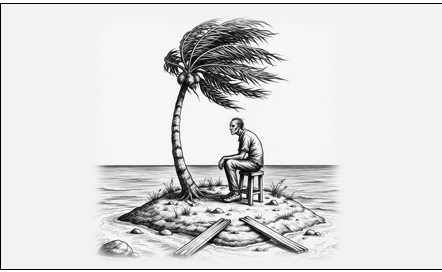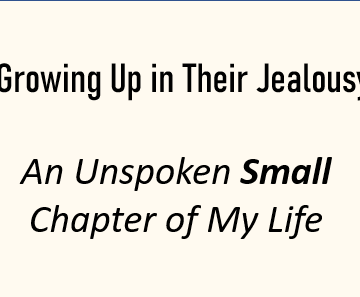🏝️ Islands of Wealth: How Money-Centric Living Is Eroding Human Connection
In today’s world, money has evolved from a tool into a mirror—reflecting not just what we own, but who we are. Financial success has become the dominant measure of worth, subtly reshaping human behavior. Interactions grow guarded, relationships turn transactional, and warmth gives way to calculation.
What emerges is a society of emotional isolation, where individuals live on islands of wealth, surrounded by abundance but starved of connection.
🧊 Rudeness as a Defense Mechanism
When money becomes central to identity, protecting it feels like protecting the self. This often manifests as rudeness—not out of cruelty, but as a shield. People become curt, dismissive, and unapproachable, especially when they suspect others might want something from them. Generosity is replaced by suspicion; kindness is seen as a liability.
This defensive posture creates a self-fulfilling loop. By pushing others away, the money-centric individual confirms their belief that people are out to exploit them. The resulting isolation reinforces their caution, deepening the loneliness they were trying to avoid. The fortress built to guard their assets becomes a prison, locking out the very warmth they secretly crave.
🏝️ The Rise of Social Islands
As every interaction begins to feel like a potential expense, people retreat. A casual conversation might lead to a sales pitch. A family gathering might come with financial expectations. Over time, connection feels costly—not just emotionally, but monetarily. So people build invisible walls, choosing solitude over the risk of being drained.
These social islands are not just physical—they’re emotional. Conversations become shallow, limited to safe topics like weather or sports. Vulnerability is avoided, intimacy is feared. The result is a feedback loop: the lack of deep relationships breeds suspicion, which in turn justifies further isolation.
🧘♂️ The Comfort of Swamijis
In this emotional vacuum, many turn to spiritual figures—not always for enlightenment, but for validation. Swamijis become financial therapists, offering mantras and rituals that soothe without demanding validation. They provide moral support in exchange for donations, creating a quiet transaction: comfort for contribution.
This reliance reveals a deep contradiction. The individual has achieved material success but feels an inner emptiness that money cannot fill. Instead of engaging in genuine self-reflection or building real connections, they seek shortcuts. The guru offers a structured, transactional relationship that feels safe—mirroring the rest of their life. It’s spiritual consumerism: buying peace without changing the behaviors that caused the unrest.
😤 The Illusion of Confidence
Wealth often breeds a peculiar kind of confidence—one rooted not in wisdom, but in ego. Financial success convinces people they are experts in all domains. Advice is dismissed, humility fades, and arrogance takes center stage.
But this isn’t true confidence—it’s performance. It’s armor designed to hide insecurity. Deep down, they fear that without their wealth, their self-worth would vanish. Admitting ignorance or error would expose cracks in their identity. So they dominate conversations, alienate loved ones, and mistake control for respect.
📢 The Trap of Aggressive Marketing
In a money-centric culture, marketing becomes a weapon. Products aren’t just offered—they’re imposed. Manipulative messaging floods our lives, reinforcing the idea that value lies in acquisition. Trust erodes, and every interaction begins to feel like a transaction.
Aggressive marketing preys on fear—fear of missing out, fear of inadequacy. It sells not just products, but a worldview: that happiness, safety, and respect come only through accumulation. This constant barrage isolates individuals further, turning friends into competitors and relationships into comparisons.
🌱 A Call for Rebalancing
In a world that rewards detachment and celebrates wealth, those who value relationships must tread carefully. They risk being overlooked, misunderstood, or taken advantage of. But human life is not just about money—it’s about the finer things: empathy, trust, shared laughter, quiet understanding. These are the true currencies of a meaningful life.
So how do we live in a world where relationships are no longer central?
- Don’t chase the impossible. Trying to maintain deep relationships with people trapped in a transactional mindset will only exhaust you.
- Build minimal relationships with those who genuinely need your occasional financial support or employment. Nurture these connections without expecting much—perhaps just a little gratitude. They may not offer emotional depth, but they can still be part of a quiet, meaningful exchange.
- Help random people you encounter, even if you’ll never meet them again. These small acts of kindness restore humanity in a world that often feels cold.
- Avoid relationships with those who’ve built solitary social islands. Their walls are too thick, their worldview too transactional. Trying to connect with them will only drain you. Most are mean-spirited and filterless, mistaking bluntness for honesty and detachment for strength. Their emotional landscape is barren, and no amount of warmth can thaw it.
In the end, the antidote to isolation isn’t more wealth—it’s more humanity. By choosing connection over competition, empathy over ego, and kindness over calculation, we can begin to reclaim the richness of life that no currency can buy.






